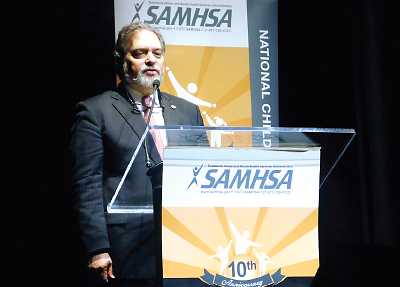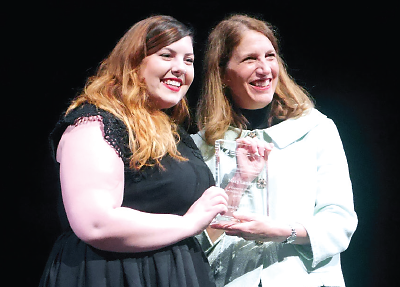APA Foundation Program Honored in Children’s Mental Health Event
Abstract
Approximately 90 percent of people who develop a mental disorder show warning signs during teen years, the APA Foundation reports.
In celebration of the 10th Anniversary of National Children’s Mental Health Awareness Day, APA and the American Psychiatric Association Foundation joined with the Substance Abuse and Mental Health Services Administration (SAMHSA) in Washington, D.C., last month to honor those dedicated to improving the mental health of children.

Then APA President Paul Summergrad, M.D., describes the Foundation’s “Typical or Troubled?” program.
“When it comes to children and teens, time is never on our side,” said SAMHSA Administrator Pamela Hyde, J.D., in addressing event attendees. “Some of our youth will face emotional abuse, use illicit drugs or alcohol, and battle mental illnesses such as depression. We cannot survive as a community without mental health care services for this population. Though we at SAMHSA have our work cut out for us, it’s good to know that we have a few champions by our to side address these health concerns.”
The theme of this year’s celebration was “Strengthening Communities by Integrating Care.” The event recognized the work of the Foundation’s “Typical or Troubled?” program, which has trained more than 70,000 teachers and school administrators, as well as more than 10,000 parents, to recognize signs of mental illness in children and adolescents and direct families to appropriate resources for treatment.
According to the National Research Council and Institute of Medicine, each year an estimated 13 to 20 percent of American children experience a mental disorder, and an estimated $247 billion is spent on childhood mental disorders.
“Through years of research, we know that early recognition, intervention, and treatment of a mental disorder can make a positive difference for a child growing up in challenging and traumatic circumstances,” said then APA President Paul Summergrad, M.D. “That’s why increasing awareness of the signs of mental illness is so critical—whether it is through a targeted program such as ‘Typical or Troubled?’ or awareness events like National Children’s Mental Health Day.”

Department of Health and Human Services Secretary Sylvia Mathews Burwell (right) presents a SAMHSA Special Recognition Award to Grammy-nominated artist Mary Lambert for her efforts to promote openness about mental health and substance use disorders.
Grammy-nominated singer and songwriter Mary Lambert was presented a SAMHSA Special Recognition Award for her efforts to promote openness about mental health and substance use disorders. Lambert, who was the honorary chairperson of this year’s celebration, has been outspoken about her own challenges with being a victim of sexual abuse and living with bipolar disorder, which was highlighted in her hit song “Secrets.”
“Growing up is difficult for anyone,” said Lambert, “but for those of us who experience mental disorders or childhood abuse, it can be especially challenging. The sooner we can be honest about our own experiences, the sooner we can focus on our own self-love and self-care.”
Other organizations recognized during the event for raising awareness for children and teen mental health included the Ann Casey Foundation, the JED Foundation, and the Clinton Foundation.
“We are really trying to help people understand that mental health conditions are just like any other condition—they need to be prevented or identified and addressed so that people can recover from them while receiving needed support,” Hyde told Psychiatric News in an interview after the celebration. “Today’s program emphasized that SAMHSA, as well as our partners who were recognized, have resources that the public can use to truly address mental health issues in children and their families.” ■



